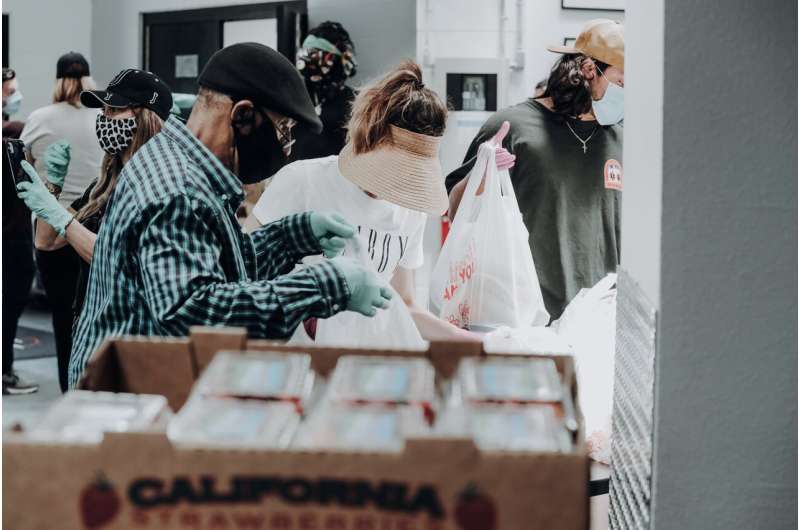Credit: Unsplash/CC0 Public Domain
New research from the University of Hertfordshire reveals the acute extent of food poverty amongst immigrants in the U.K. who have no access to welfare benefits, with widespread reports of food shortages and lack of appropriate support.
According to Citizens Advice, an estimated 1.3 million people in the U.K. have a "No Recourse to Public Funds" (NRPF) condition attached to their immigration status, meaning they have limited access to state support, even in times of crisis.
Commissioned by the Food Foundation, researchers at the University of Hertfordshire's Center for Research in Public Health and Community Care (CRIPACC) investigated the impact of NRPF conditions on dietary inequalities, such as access to food and cooking facilities. They interviewed affected families and those who support them, including staff and volunteers from food banks, community centers and immigration case workers.
Their report, published today, finds evidence of "families in destitution with little income and poor housing, unable to afford or access sufficient amounts of quality food" with "devastating effects on quality of life."
Eligibility for free school meals has only recently been extended to children with NRPF status, but there is still a widespread reliance on food banks and very low-cost low-quality food. Many families spoke of the severe consequences on the quality of their diets; one mother explained her family's reliance on cheaper unhealthier convenience food:
"[The children] don't eat all day, so we just give them food that will keep them full for a longer time, so they don't keep asking for food… Imagine working for £10 per hour, and you use that money to buy food for the children. You have to use that money to buy something that will fill the children, not what they need."
Families pointed to the lack of produce available to them, as using food banks forces them to become reliant on small amounts of tinned and dried food. One community worker also described the inadequate housing and cooking facilities that exacerbates existing health conditions, creating a snowball effect for their overall health and well-being: "If they're staying in a hotel or a hostel, you can't cook at all, because you're just in a room. How do you heat up your food? It's a nightmare. I had a guy who had some kind of Crohn's disease and was really suffering. He couldn't eat the kind of food that could keep him well. Often that's a real problem for people, especially if they're staying in temporary accommodation."
Dr. Laura Hamilton, Research Fellow in Food and Public Health who led the research, commented on the myriad of complex reasons behind these experiences, "Our findings clearly demonstrate that there is a severe pattern of food poverty and low income amongst people with NRPF status.
"There are many organizations doing incredibly valuable and difficult work, but this is a complex situation with a wide range of contributing factors—not just financial hardship, but also a lack of suitable housing, reduced public sector funding for support services, and a complicated and often inflexible immigration system that can leave people in a perpetual state of 'limbo.' Many people affected also have poorer mental health from often very traumatic experiences or can't access food that is appropriate for their culture or religion.
"The people we spoke to vividly described the ways they are marginalized by this condition of their immigration status, and it is evident that change must be urgent and system-wide to make real improvements to people's lives."
Isabel Hughes, Policy Engagement Manager at the Food Foundation said, "This important research shows just how precarious life is for those families living without the safety net of public funds, and the severe knock-on impacts that this has on their risk of food insecurity and the quality of their diets. With so many other stressors—from a complicated immigration system, to poor kitchen facilities, and long working hours—it is little wonder that a healthy diet is deprioritised.
"Food insecurity has severe long-term effects on both physical and mental health, and it is imperative that the Government acts to improve the support that is available for those living without access to public funds."
More information: Laura Kate Hamilton et al, Hostile Environments: Immigration and Food Poverty in the UK, University of Hertfordshire (2022). DOI: 10.18745/pb.25713
Provided by University of Hertfordshire
























